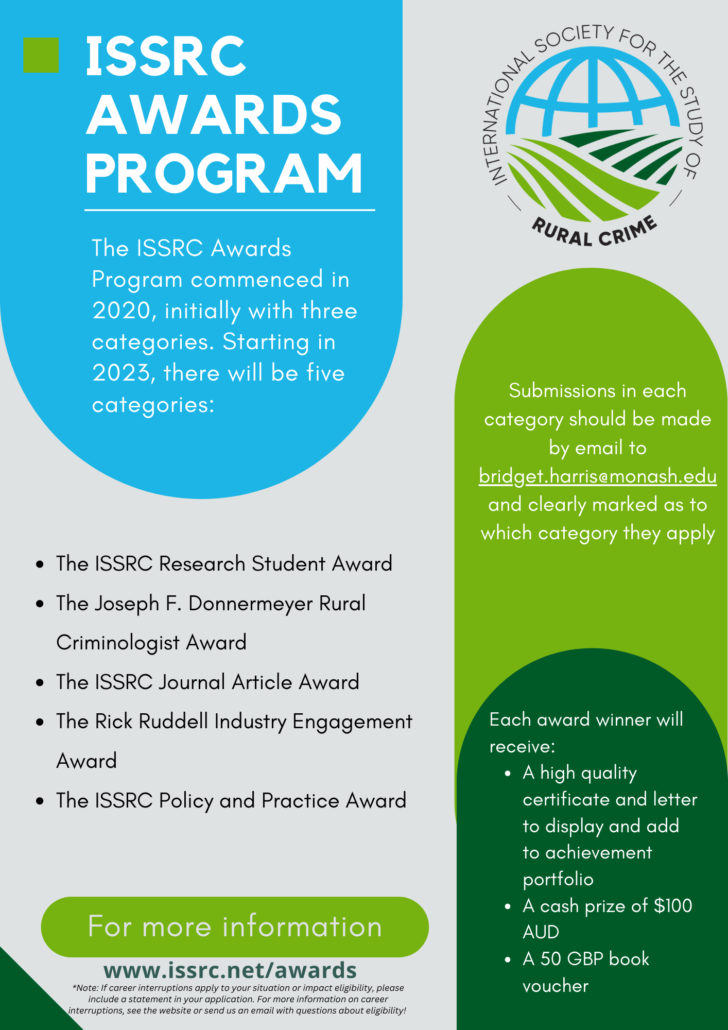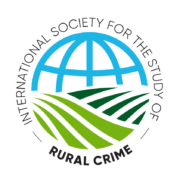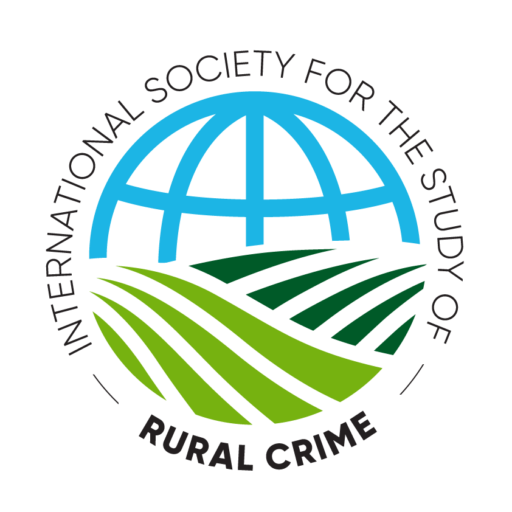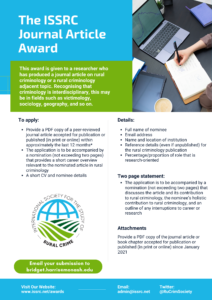2023 ISSRC Awards Program
The ISSRC Awards Program commenced in 2020, initially with three categories. From 2023, there will be five categories, as follows:
- The ISSRC Research Student Award
- The Joseph F. Donnermeyer Rural Criminologist Award
- The ISSRC Journal Article Award
- The Rick Ruddell Industry Engagement Award
- The ISSRC Policy and Practice Award
Any enquiries and all submissions for each category should be made by email to Dr Bridget Harris and clearly marked in the subject line as to which category they apply. If you do not receive a confirmation of receipt within 48 hours, please email again to request this (in case your email has mistakenly been sent to spam).
Attention should be given to the specific instructions and selection criteria for each individual award category. A panel of three ISSRC members will be appointed to determine winners in each category.
SUBMISSIONS CLOSE ON 30 SEPTEMBER 2023 – NO LATE SUBMISSIONS ACCEPTED
Prizes
Each award winner will receive:
- A high quality certificate and letter to display and add to achievement portfolio
- A cash prize of $100 AUD paid into a PayPal account
- A 50 GBP book voucher provided by Bristol University Press
Dowload the information pack
2023 ISSRC Awards Program info pack

The ISSRC Research Student Award
About this award:
- This award is given to a research student (Honours / Masters / PhD student) for a sole- authored piece of writing associated with their research (unpublished or published) in rural criminology
- The applicant can be a current student or within one year of completing their degree
- The nominee can be self-nominated or, nominated by other persons, with the nominee’s permission.
- Previous applicants are eligible to apply in subsequent years
To apply:
- Provide a PDF copy of a piece of writing (published or unpublished) related to your studies (5000 to 10,000 words) – for example, including but not limited to the theoretical or methodological framework of your work, analysis of findings and so on
- Nominees / persons nominating on a student’s behalf should include a 500 word statement outlining the contribution of the work to rural criminology as a discipline
- Provide an up-to-date resume
The Joseph F. Donnermeyer Rural Criminologist Award
This award is named in honour of Joseph F. Donnermyer, Emeritus Professor at The Ohio State University and an Adjunct Professor at the University of New England in Armidale, New South Wales, Australia. Joe was the inaugural President of ISSRC, and has been – and indeed still is – involved in many facets of the development of rural criminology. There are many scholars – and others alike – who have benefited enormously from his generosity of time and experise over many years, and his ongoing passion for this discipline.
About this award:
- This award is for early-and-mid career award (a maximum of 15 years* post-graduate degree, not including career interruptions)
- This award is given to an emerging leader in rural criminology – considering their contributions to rural criminology regarding research, teaching and, service. This is a holistic award, but nominees may highlight their contributions in all fields or particular fields. We acknowledge this may be higher in some categories than others / there may be particular focuses as determined by opportunities available to the applicant.
- The nominee can be self-nominated, or nominated by other persons, with the nominee’s permission
To apply:
The application should outline in no more than 4 pages, size 12 font, the applicants’s:
- Relevant career history, relative to opportunity Applicants are evaluated based on their career opportunities and there is consideration of whether they have experienced career interruptions.
- Research contributions (such as in projects undertaken and academic scholarship / outputs)
- Teaching contributions (in creation or teaching of courses, teaching materials and/or supervision of students)
- Service contributions and impact (in academic / discipline service i.e. editorial assistance, internal institutional or external leadership roles, reviewing for journals and grant funders, mentoring academics and/or practitioners; service to the field i.e. and dissemination of knowledge to the community and practitioners, engagement and support of practitioners, influence in policy and/or practice).
* Please include any factors that have limited opportunities (e.g. precarious employment, unemployment, non-academic employment not concurrent with academic employment, illness/medical condition, caring responsibilities, disability). Note these interuption can extend your eligability – contact Bridget for more details.
(i) disruption due to international relocation (not exceeding three months per move)
(ii) caring responsibilities
(iii) being the primary carer of a dependent child (two years per dependent child, inclusive of any period of parental leave, with no maximum identified)
(iv) a primary carer of a dependent child who has had extensive caring responsibilities (due to for instance, illness and / or disability) is eligible for a further extension (in addition to the two years)
(v) parental leave
(vi) medical condition
(vii) disability
(viii) non-academic employment not concurrent with academic employment
(ix) unemployment
The ISSRC Journal Article Award
About this award:
- This award is given to a researcher who has produced a journal article on rural criminology or a rural criminology adjacent topic
- Recognising that criminology is interdisciplinary, this may be in fields such as victimology, sociology, geography, for example.
To apply:
- Provide a PDF copy of a journal article or book chapter accepted for publication or published (in print or online) within approximately the last 12 months
- The application is to be accompanied by a nomination (not exceeding two pages) that provides a short career overview relevant to the nominated article in rural criminology
Further details required:
- Full name of nominee
- Email address
- Name and location of institution
- Reference details (even if unpublished) for the rural criminology publication (article or chapter)
- Percentage/proportion of role that is research-oriented
Two-page statement:
The application is to be accompanied by a nomination (not exceeding two pages) that discusses the article and its contribution to rural criminology, the nominee’s holistic contribution to rural criminology, and an outline of any interruptions to career or research*
*Please include any factors that have limited opportunities (e.g. precarious employment/ unemployment / employment in role with little scope to research / illness / caring responsibilities).
Attachments required:
- Provide a PDF copy of the journal article or book chapter accepted for publication or published (in print or online) since January 2021
- A short CV
The Rick Ruddell Industry Engagement Award (Academic geared)
This award is named in honour of the late Professor Rick Ruddell, a dear and much-missed friend of the Society and a highly productive scholar who published over 130 articles, technical reports, and encyclopedia entries, plus authored and edited 13 books. Rick has left an impressive legacy, as both a scholar and a person – in particular in the field of rural criminology, in which he is easily considered a pioneer especially with his research into rural boom and bust economies.
About this award:
- This award is for academics/teams of researchers who through their research or practice have actively engaged with industry and/ or community partners, and have made a contribution to a policy or practical response that enhances safety, justice or wellbeing in rural communities.
- Nominations may focus on a specific policy and practice initiative or aggregate efforts over‐time
- The nominee/s can be self‐nominated, or nominated by other persons with the nominee’s permission
- Previous applicants are eligible to apply in subsequent years
To apply:
- Nominees/nominators should write a submission (1500 words maximum) which responds to several criteria, outlining the contribution of their initiative or engagement the enhances safety, justice or wellbeing in rural communities
- A brief overview of the engagement / partnership
- What were the short or long-term aims or goals of the engagement / partnership?
- How has the engagement / partnership enhanced safety, justice or wellbeing in rural communities
- What were the outputs and outcomes?
- Nominees/nominators may also include additional material in their applications which evidences or contextualises the engagement / partnership and impacts (i.e. outputs, outreach material, media coverage, public engagement etc)
The ISSRC Policy and Practice Award (Sector Geared)
About this award:
- Nominees can be any government agency, not-for-profit organisation or individual person making a significant contribution to an initiative, who have recently undertaken innovative or significant practice and engagement pertaining to rural crime / rural crime responses
- Previous applicants are eligible to apply in subsequent years
- For the purpose of this award, a practitioner is an individual, group or organisation actively engaged in the innovation and/or implementation of policy aimed at addressing crime in rural communities broadly speaking
- Nominations may focus on a specific policy initiative or aggregate efforts over‐time
- The nominee/s can be self‐nominated, or nominated by other persons with the nominee’s permission
To apply:
Nominees/nominators should write a submission (1500 words maximum) which outlines:
The project or initiative:
- A brief overview / how does the project or initiative work?
- What are the short or long-term aims or goals?
- What are the tangible or anticipated outcomes?
- What crimes, behaviours, issues or groups does this project or initiative involve or target?
The contributions and innovation of the project or initiative, noting the impacts and unique features and possible applications and implications of this work for other regions.
- Nominees/nominators may also include additional material in their applications which evidences or contextualises the project or initiative and impacts (i.e. outputs, outreach material, media coverage, public engagement etc).
- Previous applicants are eligible to apply in subsequent years
Evidence of contribution (up to 1500 words):
- A brief outline of the initiative(s) (i.e. aims, those involved etc.)
- Evidence of outputs/outcomes generated by the policy, practice and engagement
- Statement/evidence of the significance of the policy, practice and engagement
- Statement/evidence of the individuals/teams/organisations role in developing, advancing and/or implementing the initiative(s) to address crime in rural communities
We acknowledge the generous support of Bristol University Press in providing book vouchers for prize recipients








